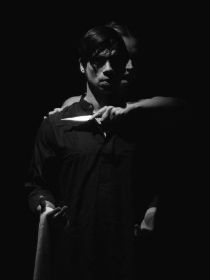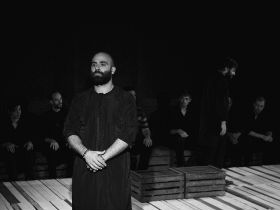saints and sinners of the stage and screen


saints and sinners of the stage and screen
Julius Caesar
The Bussey Building
8th October 2014
★★★☆☆

Photography provided by 11:11 Productions
Even if you haven't seen this particular play before, there's no getting away from the phrase "beware the Ides of March". It's all but burned into our collective conscious via parody and pop-culture references, even if most people don't know what it means. You see, despite being referenced so much Shakespeare's The Tragedy of Julius Caesar (here shortened to simply Julius Caesar) it doesn't seem to be massively popular. Hell, I've seen some of his so-called "forgotten plays" more times than I have this. But that lack of profile hasn't put off 11:11 Productions from staging an adaptation, and one which is fairly traditional at that. Often when it comes to Shakespeare, there's a trend to update the language, age and/or setting - not so here. It's a defiantly old-school production.
The first half-hour sees Brutus (Vangelis Christodoulou) and Cassius (Adam Elms) arguing over whether they should arrange for Caesar (Matthew Eades) to be bumped off. Given these are dark scenes of conspiracy and betrayal, you can see the appropriateness of shrouding these moments in darkness. However, lighting designer Luca Romagnoli keeps the lights down low for too long - a few shadowy scenes can be effective, but here the audience begin to lose focus. It's unfortunate this oversight is at the start, with the lighting in the rest of the play far better considered.
The great man himself gets very little stage time, with Eades therefore taking on the role of a character we don't especially love or hate; we just don't get to know him well know to decide whether his back-stabbing (in the truest sense!) friends and colleagues are justified in the course they take. Granted, it's not hugely set out in Bill's script, other than highlighting his fatal flaw and hailing him as a great man, but that's what directors are for, and Samuel Wood needs to tease the man out from the myth. Following his assassination, the play loses a lot of momentum. This tends to always be the case - as noted, it's a difficult script. But Wood makes an odd decision not to chuck in an interval and break up that play at this point, and that's all on him.
I'm a firm believer that it's generally hard to make anything over 90 minutes straight through work well, more so when it's a classical text. At least, not without some sort of massive dragon, a man who turns green and punches things or some singing to invigorate things. It's amazing how much a rest helps both the audience and the narrative and at two hours without a breather, Wood is on shaky territory. You can understand his reluctance to break a production at the Bussey Building; there's a long set of stairs between the performance space and the holding area at the cafe downstairs, but either he needs to allow for a 20 minute pause in proceedings or just hack the script down. This is a play where cutting things is key, after all.

Photography provided by 11:11 Productions
For a play which is so po-faced - and so long - some welcome relief comes in the form of Max Warrick's Lucius, a slave who only wants to get a bit of kip, but who keeps having to do stuff. Imagine that. A Roman servant having to do stuff! He's a delightfully clownish figure, and every time we see his petulant face, we know we're in a for a few laughs. The women too lift this piece - Brutus's frustrated and concerned wife, Portia (Kellie Jane Walters) and Caesar's delicate and ignored wife, Calphurnia (Charlotte Gascoyne). Until they make an appearance and bring some more interesting emotions, it's very much a play about men arguing over something and nothing - not an inaccurate portrayal of Roman politics or indeed, today's, but nonetheless not the most gripping stuff.
It's not until late in the day that we get to spend time with Marc Antony (Matthew Crowley). His impassioned defence of his violently dispatched friend is touching, and the forum scenes planned out nicely by Wood to make full use of the space and the large ensemble. Indeed, with the set very minimal, the cast are often used as background scenery, lined up against the back wall, watching the action unfold. Sitting together they become the eyes of the ordinary Romans, watching as their lives irreparably change.
You may have noticed that as much as we love the Bard, we also know that, like anyone, he has off days. That's probably why this isn't aired often - it's just difficult in all respects. But saying that, we've seen some of his best works done terribly and some of his more awful works done staggeringly. So where do 11:11 Productions fit in? They don't quite get every aspect right, but they do make a fairly decent stab - excuse the pun - at it. Is it worth going to see? Well, when in Rome. Or indeed in this case, when in Peckham.
Julius Caesar opened on 7th October and runs until 25th October 2014 at the Bussey Building.
Nearest tube station: Peckham Rye (Overground)